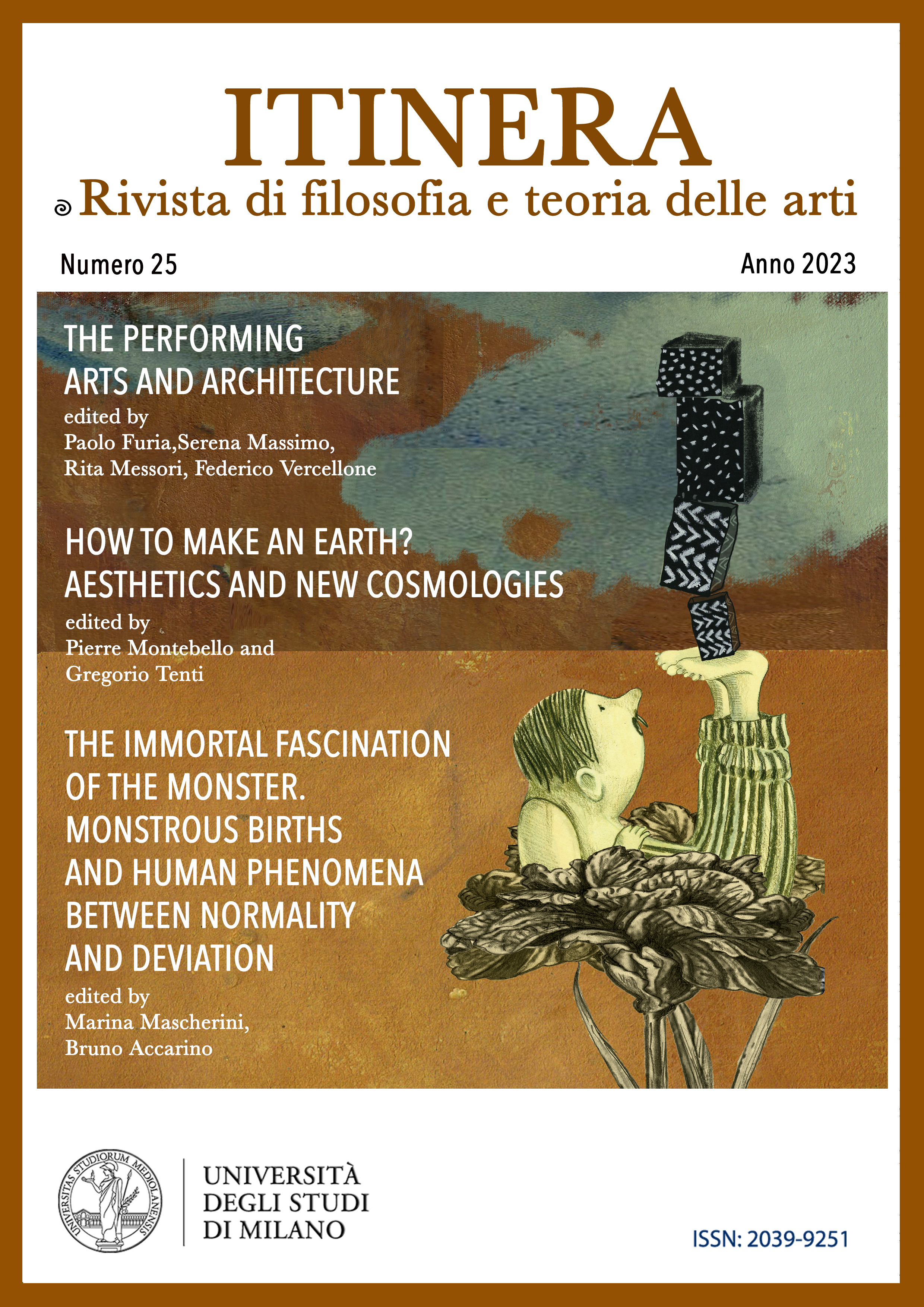Ri-posare For a hermeneutics of belonging in Merleau-Ponty, Dardel and Berque
DOI:
https://doi.org/10.54103/2039-9251/20825Keywords:
Rest, Earth, Base, chora, médianceAbstract
What happens when consciousness fails? What happens to the connection with our experiences when we abandon ourselves to torpor, when “the light goes out”? Merleau- Ponty answered these questions in his course on Passivity, commenting on the status of the unconscious, sleep, dreams and memory. These are modalities through which the subject discovers a renewed adherence, a deeper sense of belonging to the world, and a peculiar ontological inherence or confidence. In the lethargic reabsorption, Merleau- Ponty so read Proust in The Problem of the Word, the sleeper rediscovers a carnal past with an enigmatic character, for which the anchorage to the stasis of rest, already personifies, the virtualities of a project, a specific “kinetic initiation”, the attribute of an ‘imminent movement’. It is from these intentions that one can trace the genesis of Dardel’s reflection on the nature of inhabiting, of human existence confined to the Earth. To inhabit a surface geographically is first and foremost to “rely, through sleep, on what lies (...) beneath us: the base on which our subjectivity folds”. To exist means “[re]starting from there (...) in order to untie from the surrounding world the ‘objects’ to which (...) our attention will be directed”. Starting from the Berquean assumption according to which the “spatiality of existence”, in all its meanings, “is movement and not -, conversely, motionless, and therefore sterile, - rootedness”, as also attested by Barbaras in L’appartenance, this essay highlights the essential character of ‘coexistence’ in which men and the world in its geographical consistency participate. It, therefore, investigates the conditions, the conjugations, as said, ‘terrestrial’, by means of which the ‘inner geography’ is articulated - and therefore, in the same way, disarticulated - as past, repetition and the creative newness, the future of which is the indispensable presupposition, is the ‘basis’; and the work of man, the implication of which ties his destiny to the ‘moving extension’ that is the Earth. This study concludes with the recognition of a twofold but unique, singular movement within existence, which alternates exhibition and withdrawal, vital élan and relapse into materiality, according to the coordinates of a “reality that is made through that which is undone”.
Downloads
References
Barbaras, R., L’appartenance. Vers une cosmologie phénoménologique, Peeters, Louvain-La-Neuve 2019.
Bergson, H., L’evoluzione creatrice, a cura di M. Acerra, Rizzoli, Milano 2012.
Berque, A., Ecumene. Introduzione allo studio degli ambienti umani, a cura di M. Maggioli, Mimesis 2019.
Besse, J.-M., Géographie et existence d’après l’œuvre d’Eric Dardel, in E. Dardel, L’homme et la Terre. Nature de la réalité géographique, Éditions du CTHS, Paris 1990.
Besse, J.-M., La Terre et l’habitation humaine : la géographie phénoménologique d’après Eric Dardel, in A. Berque, P. Nys (éd.), Logique du lieu et œuvre humaine, Ousia, Bruxelles 1997.
Besse, J.-M., Voir la Terre. Six essais sur le paysage et la géographie, Éditions Parenthèses, Marseille 2021
Dardel, E., Écrits d’un monde entier, Éditions Héro-Limite, Genève 2014.
Dardel, E., L’uomo e la Terra. Natura della realtà geografica, a cura di C. Copeta, Unicopli, Milano 1986.
Dufrenne, M., Vers l’originaire, in Esthétique et philosophie. Tome II, Editions Klincksieck, Paris 1976.
Franck, R., L’Ecriture sensible, Classiques Garnier, Paris 2021.
Merleau-Ponty, M., Fenomenologia della percezione, tr. it. di A. Bonomi, Bompiani, Milano 2002,
Merleau-Ponty, M., Il mondo sensibile e il mondo dell’espressione. Corso al Collège de France, tr. it. di A. C. Dalmasso, Mimesis, Milano 2020.
Merleau-Ponty, M., Il visibile e l’invisibile, tr. it. di A. Bonomi, Bompiani, Milano 1994.
Merleau-Ponty, M., L’institution, la passivité : Notes de cours au Collège de France (1954-1955), Belin, Paris 2003.
Merleau-Ponty, M., L’occhio e lo spirito, tr. it. di A. Sordini, SE, Milano 1989.
Merleau-Ponty, M., La natura. Lezioni al Collège de France 1956-1960, a cura di M. Carbone, Raffaello Cortina Editore, Milano 1996.
Merleau-Ponty, M., La prosa del mondo, tr. it. di M. Sanlorenzo, Editori Riuniti, Roma 1984.
Merleau-Ponty, M., Le problème de la parole. Cours au Collège de France. Notes, Metis Presses, Genève 2020.
Merleau-Ponty, M., Linguaggio, storia, natura, a cura di M. Carbone, Bompiani, Milano 1995.
Merleau-Ponty, M., Segni. Fenomenologia e strutturalismo, linguaggio e politica. Costruzione di una filosofia, tr. it. di G. Alfieri, Milano, Il Saggiatore 2015.
Merleau-Ponty, M., Senso e non-senso, tr. it. di P. Caruso, Milano, Il Saggiatore 2016.
Proust, M., La strada di Swann, Einaudi, Torino 1963.
Downloads
Published
Versions
- 2023-08-17 (3)
- 2023-08-17 (2)
- 2023-08-08 (1)
How to Cite
Issue
Section
License
Copyright (c) 2023 Riccardo Valenti

This work is licensed under a Creative Commons Attribution-ShareAlike 4.0 International License.
The authors who publish in Itinera are required to accept the following conditions:
1. The authors retain the rights on their paper and lincese the journal the right of first publication. The paper is also licensed under a Creative Commons License, which allows others to share it, by indicating intellectual authorship and its first publication in Itinera.
2. Authors may adhere to other non-exclusive license agreements for the distribution of the published version of the paper (ex. deposit it in an institutional archive or publish it in a monograph), provided that its first publication in Itinera is indicated.
3. Authors can disseminate their paper online (ex. in institutional repositories or on their website) before and during the submission process, since this can lead to productive exchanges and increase quotations of the published work (See “The Effect of Open Access”).





